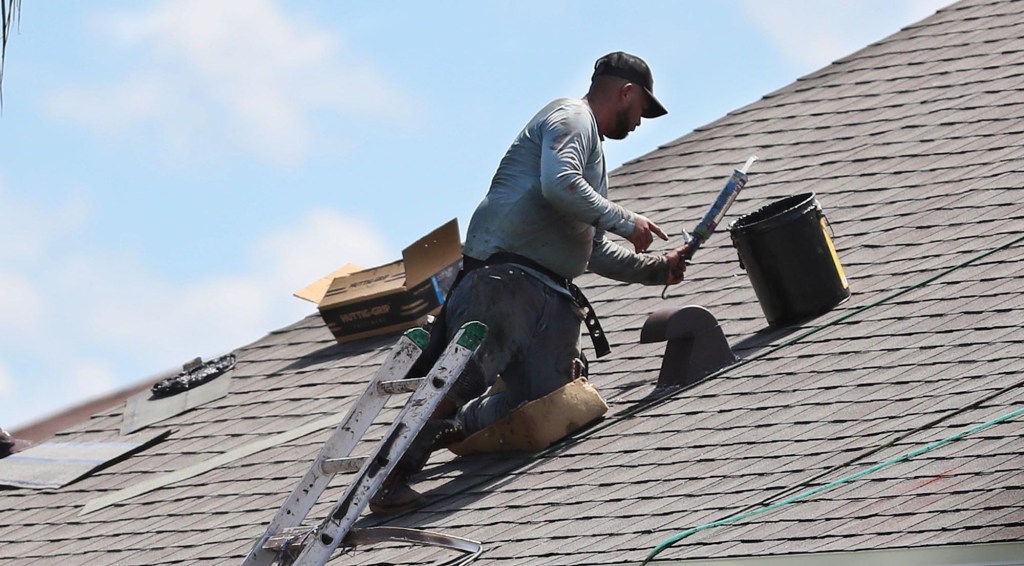Only about a third of more than 122,000 Florida homeowners who signed up to the My Safe Florida Home program since 2022 have completed their home-hardening improvements and received grants, a program official said Wednesday.
Steven Fielder, who oversees the program for the Florida Department of Financial Services, told the House Insurance and Banking Subcommittee that low-income applicants often fail to finish the program because they can’t afford project costs that exceed the $10,000 grant cap for eligible homeowners.
Fielder told lawmakers that only 40,719 of 122,057 homeowners who received free initial home inspections have received grants of up to $10,000.
Grant applications have been approved for 63,073, according to data presented by Fielder. That means that nearly half of all initial applicants, 56,984, never followed through by requesting approval for a grant, the data shows.
About a third, 43,003, finished their projects and had final inspections. Of them, 2,284 are awaiting their grants.
The program was approved by the Legislature in 2022 to both help homeowners harden their homes to resist hurricane damage and qualify them for discounts off of their insurance premiums, which at that point were increasing sharply each year. Florida law requires insurers to reduce premiums for policyholders whose homes have windstorm mitigation features.
The program offers up to $10,000 for homeowners who install impact windows, hurricane shutters, wind-resistant exterior doors and garage doors, reinforce the connections between their roofs and walls and install secondary water barriers under their roofs. The roof improvements usually require full roof replacements, which the program also helps to fund.
Homeowners who are approved for grants have up to a year to complete their projects and request their money. They can also request a six-month extension.
So far, the program has reimbursed $384.5 million out of $833.8 million allocated for grants over five legislative sessions since 2022, Fielder said.
Initially, the program required homeowners to pay $1 for every $2 they received in grant funding with no income-related eligibility restriction.
Low-income households, with incomes under 80% of their county’s average, aren’t required to put up any matching funds, but moderate income applicants, defined as earning less than 120% of their county’s average, still must provide a match.
Over the past two years, the program has prioritized low- and moderate-income households, as defined by the federal Department of Housing and Urban Development. This year, only those households are being considered for new applications.
Fielder said homeowners don’t complete their projects for various reasons.
“For many folks, once they get quotes (for improvements), they realized they didn’t have the match, for example,” he said. “Or if they were low-income, the roof was going to be $12,000 or $13,000 but the grant’s only $10,000. So some of them are still out there searching for maybe finance options, or I’ve had homeowners that I’ve spoken to that borrowed money from a family member to help them get going.”
Another reason that Fielder did not mention: Low-income applicants might have trouble finding contractors willing to complete projects with no money down and wait for the applicant to receive a grant before getting paid.
Although low-income homeowners receive priority for grant eligibility, neither the statutes outlining how the program must function, nor the program’s website, describes any method by which the state will pre-pay their contractors, or pay installments as work commences.
Low-income homeowners can request payments from the program to cover actual costs of improvements “completed by the contractor,” the program website states.
The website states that homeowners are responsible for paying their contractors while also noting, “The My Safe Florida Home Program and the Department of Financial Services are not involved in or responsible for the payment process or communication with the Contractor.”
Funds allocated but not spent will likely be made available to new applicants sometime in the near future. In March, the program freed $103 million in unclaimed funds for new applicants.
Further information is available at mysafeflhome.com or by calling 561-640-6734.
Responding to questions from Rep. Marie Paule Woodson about the low completion rate, Fielder said availability of funds is probably the biggest reason some applicants fail to finish their improvements.
“And we’ve tried to help as much as we can with that,” he said. “Really the only help we can provide is just some guidance (for) folks that may be able to help them with the financing. But they do need to be careful so they are not being taken advantage of. I’ve seen some of that as well.”
Since the application portal reopened on Aug. 4, initial inspections have been completed for 12,394 homeowners and 1,514 have been reimbursed. Fielder said the low number of reimbursement reflects the length of time required to complete improvements.
Several House members raised questions about the program’s effectiveness.
Rep. Hillary Cassel, representing Broward County, questioned why only 20,995 grant recipients saw their insurance premiums fall after completing their improvements while 17,674 saw no changes or premium increases.
Fielder said that some homeowners entered the program after their insurers threatened to cancel their policies if they did not get a new roof.
“So I still count these as wins for the program,” Fielder said, because “now they’re insured.”
Rep. Adam Botana, who represents parts of Collier and Lee counties, suggested that the $700,000 cap on insured value for eligible homes should be “moved down,” and noted that his district is home to a lot of mobile homes, which aren’t eligible.
Fielder said the upcoming legislative session beginning in January will present opportunities to revise how the program works. “Anything’s possible,” he said.
Ron Hurtibise covers business and consumer issues for the South Florida Sun Sentinel. He can be reached by phone at 954-356-4071 or by email at rhurtibise@sunsentinel.com.
Originally Published: October 16, 2025 at 7:45 AM EDT

